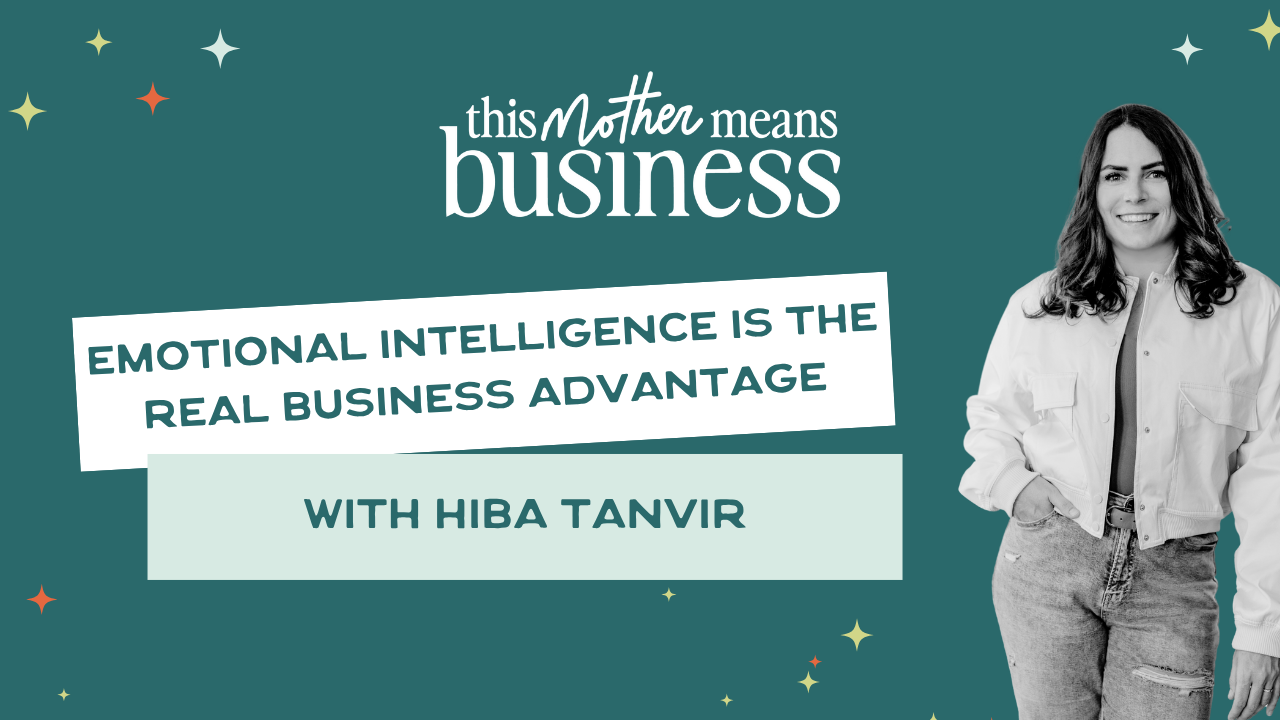Emotional Intelligence Is the Real Business Advantage (with Hiba Tanvir)
Nov 13, 2025
Why Emotional Intelligence Matters More Than Ever
We talk a lot about mindset and strategy in business — but what about the emotional side of leadership?
In this week’s episode of This Mother Means Business, I sat down with emotional intelligence expert Hiba Tanvir, founder of HT Compassion, to talk about how emotional intelligence (EQ) shapes everything from the way we lead our teams to how we parent our kids.
As entrepreneurs, we often carry a heavy mental and emotional load. We’re managing clients, deadlines, and families — and the truth is, there’s a cost to that. As Hiba says, “We all pay a mental and emotional price every single day in business. The question is: how much are you paying?”
This episode explores how developing emotional intelligence isn’t just about feeling better — it’s about leading better, relating better, and thriving through change.
The Four Pillars of Emotional Intelligence
According to Hiba, emotional intelligence is both a science and an art. It’s not about suppressing emotions or becoming endlessly calm — it’s about understanding and managing them in a way that creates synergy and connection.
She breaks EQ down into four key pillars:
- Self-Awareness – Knowing what makes you tick. What triggers you, what motivates you, and what strengths (or weaknesses) shape your reactions.
- Self-Management – Using that awareness to respond thoughtfully instead of reacting impulsively. As Hiba says, “Self-awareness without self-management is just a license to be obnoxious.”
- Social Awareness – Reading a room, sensing what others are feeling, and having empathy for the people you lead.
- Relationship Management – Inspiring, motivating, and collaborating from a place of emotional balance.
When these four pieces work together, they form the foundation for great leadership — and healthy relationships, both at home and at work.
In the Age of AI, EQ Is the Real Intelligence
One of my favorite moments in this conversation was when Hiba said:
“In the artificial intelligence era, emotional intelligence is the real intelligence.”
While AI can mimic empathy, it can’t be human. The ability to read emotions, connect authentically, and lead with compassion will only become more valuable as technology advances.
EQ isn’t a soft skill — it’s a strategic advantage. Studies show that emotionally intelligent leaders build stronger teams, reduce turnover, and create more productive workplaces.
Empathy vs. Compassion
We hear a lot about empathy these days — especially on LinkedIn — but Hiba makes an important distinction.
Empathy is feeling with someone. Compassion is taking action to help them.
“You’re never going to meet an emotionally intelligent person who isn’t compassionate,” she said.
“And you’ll rarely meet a truly compassionate person who isn’t emotionally intelligent.”
It’s a reminder that caring isn’t passive. It’s proactive — it’s showing up, taking responsibility, and doing something that makes a difference.
From Reacting to Responding
Hiba introduced a practical tool called Pause, Paraphrase, Pivot — a simple way to move from reaction to thoughtful response.
- Pause: Stop and take a breath before saying or doing anything.
- Paraphrase: Acknowledge the emotion — yours or someone else’s. (“I can see you’re frustrated.”)
- Pivot: Choose a calmer, more productive way forward.
That pause alone can be transformative. It helps us move from what Hiba calls the “downstairs brain” (our reactive emotional center) to the “upstairs brain” (where logic, empathy, and reason live).
Raising Emotionally Intelligent Kids
As moms, we’re not just building businesses — we’re shaping future adults. And if we want emotionally intelligent leaders in the next generation, it starts at home.
Hiba shared beautiful examples from her own parenting: asking her kids to name their emotions, giving them tools like punching bags to release frustration, and — most importantly — teaching them to repair after conflict.
“Repairing is the skill we really need to build,” she explained.
“When repair doesn’t happen, it leads to shame that follows us into adulthood.”
Instead of time-outs, Hiba uses “time-ins” — calm spaces where children can regulate before returning to reconnect. It’s a shift from punishment to understanding.
The Takeaway
Emotional intelligence isn’t about being perfect, calm, or unshakable. It’s about being human on purpose — noticing what we feel, managing it with awareness, and leading with compassion.
Whether you’re raising kids, leading a team, or building a business, your EQ is your greatest edge.
So the next time you feel triggered, overwhelmed, or reactive, take a breath. Name it. And remember: the goal isn’t to avoid emotion — it’s to use it wisely.


